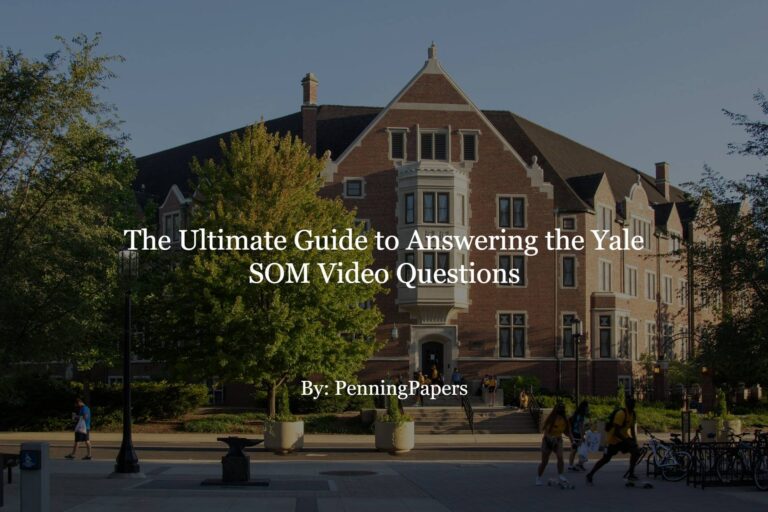Note: The Yale SOM video questions are subject to change. This article is for 2024 -25 admissions cycle.
The Yale School of Management (SOM) video questions are one of the best ways to let admissions officers know you for “you.” Yale receives plenty of applications every year. So, standing out with proper communication skills, presentation, and “vibe” is crucial. This is your one chance to leave a lasting impression beyond transcript numbers.
Also keep in mind that the Yale SOM video questions are a reflection of your character. And, admissions officers pick up on more details than you think.
So, don’t skimp out on it!
This guide will cover everything you need to prepare solid responses to the Yale video essay prompts.
Professional College Application Help.
Contact us. We'll get to you within 24 hours.
Table of Contents
- What is Yale’s SOM Video Essay?
- How Important is the Yale Video Essay for MBA Admissions?
- How Does the Yale Video Essay Work?
- Deadline
- What Kinds of Questions Will Yale Ask in the Video Essay?
- The Importance of a Sophisticated Philosophy.
- The Underrated Value of One-On-One Practice Sessions.
What is Yale’s SOM Video Essay?

It’s a vibe check!
Yale’s SOM video essay questions (and really all MBA video essays for that matter) are holistic methods of assessment.
Think of it like an interview. When you enter an interview, what factors are assessed? There’s your resume, sure. But, there’s also your posture, manner of dress, personality, speech and tone, creativity in responses, and more!
The video essay lets your admissions officers check for red flags in your character. This lets them screen you for “icks” before letting you join the Yale community.
How Important is the Yale Video Essay for MBA Admissions?

Answer: It’s pretty darn important.
Again, MBA video questions are vibe checks. They don’t just assess the answers you give, but other factors as well. Sometimes, small details and externalities paint a vivid picture of your character, determining what sort of candidate you’ll be.
Here’s an example.
Let’s say you answer a question very hurriedly to meet the time limit; but, you end up contradicting one of your statements in the Statement of Purpose. This can mean a whole host of things. Perhaps you were just tired and anxious. Or, maybe you don’t truly believe what you said in your Statement of Purpose since you contradicted yourself. It could imply a lack of care.
Or, maybe it was just a brain fart!
Who knows!
The point stands. The Yale video questions are windows into your character. They make a massive difference in determining your chances of acceptance.
Oh, and don’t forget. Their “vibe check” doesn’t just scan for red flags but green ones too. It’s typical for admissions officers to see more green flags in students than they themselves know of! For instance, answering a prompt creatively can imply you’re on top of things, you came prepared with contingency answers, or even that you’re mature in your world view!
So, the Yale video essay is very, very, important. We’re aiming for green flags here, not red ones.
How Does the Yale Video Essay Work?

Where to find it:
After submitting your application, you should receive an email from Kira Talent. It contains a link where the video essay takes place.
Click on the link, sign in, then start the session.
There will be 3 Yale video essay questions in total. You must answer them one at a time. Each one is random, and covers specific category.
Time Limit
Below are the time limit rules for each question.
- Question 1 provides 20 second to think of a response, then 60 seconds to answer.
- Question 2 provides 30 seconds to think, then 90 seconds to answer.
- Question 3 provides 20 second to think of a response, then 60 seconds to answer.
Notice how they don’t give you much space to think before providing a response? You’re really going to be on your toes here. So, it’s crucial that you practice with example questions and formulate creative answers for each one.
One of the easiest things you can do to have bulletproof answers is to write out your responses to example questions in a draft. Then, have a professional interviewer of college admissions consultant read through your responses. Here at PenningPapers, we often advise students on creative ways they can look at questions from different angles, which has helped countless students get accepted into some of the best MBA programs in the nation.
Some Important Details Regarding Rules
You can’t pause the video questions process.
Let’s say it louder for those in the back.
You can’t pause it!
When you start the process, you’ll be greeted by a Yale member or alumni reading the questions you must answer to you. You can also read the question below the video. The screen then disappears, and the video will show your face on the screen. (totally not scary…)
You’ll be given time to think and brainstorm an answer (20 seconds for prompts 1 and 3; 30 seconds for prompt 2). Then, you’ll answer the question (60 seconds for prompts 1 and 3; 90 seconds for prompt 2.)
You can’t redo any of the Yale video essay questions. Once you’ve provided your answer and the timer runs out, it’s done. That’s why preparing for the prompts by practicing and drafting example answers is so, so crucial!
About Yale’s SOM Behavioral Assessment
According to Yale’s SOM site, the behavioral assessment measures “interpersonal and intrapersonal competencies associated with business school success…”
This is a short fixed-choice assessment and does not require previous preparation like the video essay does.
Nonetheless, it’s still an important aspect of the application. After all, why would they include it if it weren’t important?
Deadline

The Yale SOM video essay questions must be submitted no later than 48 hours after the round’s deadline.
What Kinds of Questions Will Yale Ask in the Video Essay?

As mentioned previously, Yale has 3 questions for their video essay section. They all fall under their own category.
The first question will ask a question in the form of why you want to attend Yale, why you want to pursue an MBA, or both.
The second question asks some form of management, team building, or team behavior question.
The third question asks a critical thinking question.
We’ve deconstructed each category below for you to view.
Question 1 Category: Why Yale/MBA?
The first Yale SOM video question covers why you want to pursue Yale or an MBA at Yale. It’s usually something along the lines of “Why Yale” or “What do you hope to achieve with an MBA at Yale?”
This category is important because it tells Yale admissions officers whether you’ve actually got a plan prepared. Some students just want to attend Yale for the prestige. Others want an MBA because they don’t really know what they want to do after earning their bachelor’s degree.
This is no basis for a solid answer.
The goal is to prove you’re someone who knows why earning an MBA at Yale would help them in their goals for the future.
Some things you should consider include but are not limited to the following…
- School curriculum and class content.
- Professors you would love to learn under and the research they do.
- Interesting clubs
- Campus environment
- Internship opportunities
- Networking opportunities
Also, here are some example questions for you to practice on.
- Why Yale SOM?
- What is the purpose of pursuing an MBA right now in your academic/work career?
- How would an MBA from Yale SOM benefit you in your career? What will you use your education for?
Note that these elements need to be personal to what you need. While one person may prefer one element of Yale, you may prefer others.
Additionally, some small factors may seem initially small to others; but, they can be especially important to you. For instance, some people require the fast-paced environment of an East Coast school to have a proper learning ecosystem; and, learning in a rural area could be soul-crushing –which inexorably interferes with the learning quality.
Oh yeah, and don’t forget to be hyper-specific about the resources Yale’s SOM has to offer! It helps to show that you did your research.
Hint: it helps to work think about this question backwards. Instead of thinking about how a Yale education or MBA program can help YOU, think about how it can make you someone capable of helping OTHERS. Business is intrinsically empathetic. It prioritizes other people. Whether it’s your client’s portfolio, a business looking to merge, or even online fans of your YouTube channel, your business prioritizes others. This is a crucial element that most students forget. Showing admissions officers that you’re capable of thinking about how to help others with your education will ground your answer in real world applications. And hey: you get a few extra brownie points for being empathic!
Question 2 Category: Management, Team Building, and Behavior “Stuff.”
An MBA environment demands good “people” skills. That means good management, adaptation, team building, communication, and all manner of behavior “stuff.” In other words, can you cohabitate in a business setting?
Now, some of these questions may come in the form of, “what do you do when there’s a major disagreement in a conference?” or “what was one instance you helped someone who was in need?”
More specifically, here are some sample questions for your reference.
- Yale is committed to supporting an environment of diversity, equity, and inclusion. How would you address a lack of inclusion in the workplace?
- How do you help motivate a team that is not cooperating with one another as a team?
- What is your go-to strategy for when new colleagues, classmates, or peers are visibly struggling or confused?
If you have a real-world example to draw from, great! You’re practically set. For instance, you might respond to a question about major disagreements with “I utilized my active listening skills I learned during my business consulting internship to understand the client’s needs, despite them being very disagreeable behind a language barrier.”
Now, this is where the hard part begins. Sometimes, you can’t answer the Yale SOM video prompt 2 because you don’t have any real world experiences to draw from. Or, you may not have any recent experiences to draw from. That’s okay! It’s not going to be easy, but you can still answer it.
In the offchance you don’t have an example answer, you can answer by explaining what you “ought to do.” That is, “If I were in this situation, I would do ‘x’.”
Now, this doesn’t sound as good as having a solid real world example to back up your claims. But, it’s much better to just be honest, forthright, and confident about your answer than to weasel through with some lackluster example. Remember: you only have a 30 seconds to brainstorm. So, trying to shoehorn some example from an experience you vaguely remember is just going to sound forced, awkward, and strange. You want to prioritize being organic and transparent with the admissions office, even if you feel your answer is subpar.
Additionally, if you don’t have a real-world answer to base your claims on, explain your personal philosophy surrounding the question. Use your ideology as a basis of what you ought to do. This grounds your answer in validity and ensures you’ve at least thought through your answer in a sophisticated manner.
Here’s an example.
Let’s say you’re asked how you manage other people. You may say something along the lines of…
“I’ve leadership and management roles throughout my life. Some were more important than others. I’ve cabinet positions in my school clubs such as Speech and Debate as well as Journalism. And, I’ve worked with peers in my classes as the de facto leader during class presentations.
Extrapolating from my experiences across the board, I’ve come to realize I manage people much like a Psychologist does. That is, I pay attention to the kinds of strengths and weaknesses my peers have –judgement free, of course– such that I can create ‘mental web’ of everyone’s personality dimensions. Then, I assign roles based on such roles to maximize output and minimize risk. In some ways, this is a very consultant-like approach to projects since I implement principles of psychology to execute principles of risk-management. And, while I’ve come across my fair share of disagreements during Speech and Debate –pun unintended– and uncomplimentary personality pairings during school projects, I’ve noticed that this compartmentalized approach has streamlined processes all across the board.
And, as a personal philosophy, I always let others have a say in how they would like to be assigned tasks. After all, it’s not a monarchy; for, few group settings succeed through autocratic leadership.”
This doesn’t use real world examples and admits that there are no recent examples such as fancy internships at Goldman Sachs. But, it’s honest, transparent, and still addresses the question based on personal philosophy. Don’t be afraid to give solid yet honest answers that require you to admit a lack of experience. Jim Donovan covers this concept of honest and transparent responses despite lacking experience in his video here.
Hint: Sometimes, Yale’s SOM video question 2 provides a great opportunity to give very creative answers. You can use this opportunity to show that you’re someone who doesn’t just have generic answers to problems. For instance, let’s say you’re a big Math nerd. You may have heard war plane armor problem. In World War 2, United States fighter jets returned from battle after fighting Japanese Zero planes. They had multiple holes across the body; and, generals logically responded by reinforcing the spots most peppered in bullet holes. A famous Mathematician proposed they reinforce the spots untouched by bullets –as that would reinforce spots shot in planes that did not return from battle. In the same vein, you may have a way of looking at problems in an unconventional way that flips a seemingly obvious answer over its head.
Question 3 Category: Critical Thinking/Philosophy Question
Yale also asks students a business and management-related critical thinking question. This typically comes in the form of an abstract question that requires you to swiftly conjure a smart or clever answer.
Additionally, these questions require you to have a solid basis of moral, intellectual, and work philosophy.
Here are some example questions you may be asked.
- Please provide your opinion on the following statement: in leadership, the most important quality is empathy. For, without it, team coordination cannot exist.
- Do you agree or disagree with the following statement? “It can often be valuable for those speaking with clients to provide insight that goes against their best interest; for, doing so can establish trust in the long run with the client.”
- Please provide a response to the following statement, and explain your reasons why. “Plans are often worthless, but planning is priceless.”
These questions are not meant to trick you.
Also, you’re not required to find a “right or wrong” answer. In fact, the Yale SOM video question 3 prompt is meant to measure your ability to abstract and wrestle with sophisticated ideas.
Instead of fishing for an answer that will impress admissions officers, try to wrestle with the question in the same way a philosopher does. This is why we also call prompt 3 a “philosophy question.” It often can’t have a solid answer without a well-fleshed-out moral compass or intellectual set of heuristics.
Can you work around an abstract question with no clear answer? Can you extrapolate from your own knowledge and draw from it? And, can you use critical thinking to articulate a sophisticated answer that demonstrates complexity and intellectual fortitude?
These are all important questions to ask yourself while preparing for prompt 3.
Hint: we recommend preparing for this question by spending some time thinking about business dichotomies. Often, the Yale SOM video question prompt 3 will NOT ask easy and straightforward yes or no questions. You won’t get a simple question. These are critical thinking ones where morality, personal philosophy, and sometimes even political ideology may interrupt you from having a clear answer. So, business dichotomies where 2 sides are often equally valid are great places to start. Think about real-world industry dichotomies and practice forging your own ideology to answer these questions.
This prompt is actually very similar in style to the SAT essay prompts that were used in the 2400 scale. (minus the business and management topics.) They typically asked students a moral or philosophical question, then gave them 30 minutes to write a short essay proving their open-ended opinion on it. So, you can use that to practice as well!
The Importance of a Sophisticated Philosophy.

This seriously can’t be stated enough.
Yale’s SOM video questions have MANY different interpretations and possible answers. Having a sophisticated philosophy and ideology makes answering these questions very, very easy.
And no. You don’t need to read Socrates or anything. But, you should have more sophisticated opinions predicated on carefully thought out theories and perspectives.
If you just answer the prompts with “easy” or obvious conclusions, admissions officers won’t be convinced you have what it takes to look at the prompts from multiple angles. Having an in-depth philosophy makes creating great sophisticated answers much easier.
But, if you’re a procrastinator (like most of us, hehe…) you won’t have enough time to actualize a well-articulated moral and personal philosophy. So, you won’t have the foundational heuristics that others have to answer these prompts smoothy.
That’s why we recommend reading up on opinion articles from the Wall Street Journal and the New York Times. Read a few publications from the Op Ed per day, and paraphrase the writers’ opinions in your own words. This is one of the fastest ways to develop a decently sophisticated philosophy that guides your answers throughout the Yale SOM video questions. (And, any of the MBA interview processes for that matter.)
Note: this doesn’t mean you have to have perfect answers to every Yale SOM video question. The goal of applying for an MBA is to learn. You’re going to be imperfect. And, likely, you’ll meet people at the same age as you who’ve made mistakes as well. Don’t let perfectionism and the fear of providing “cringey answers” get in the way of creating interesting or compelling answers.
The Underrated Value of One-On-One Practice Sessions.

For some reason, most students prepare for the Yale SOM video questions alone.
And hey: we relate! After all, we don’t want to bother people with our stuff. And, sometimes scheduling a time with other people who have their own work can be too much trouble.
Besides, it can be embarrassing! Give a dumb answer? Boom! The person you’re practicing with thinks you’re unprepared and unworthy you are for an MBA! Well, that isn’t likely to happen, especially with friends. But, it’s the anxiety that makes it unbearable! Better to just practice alone in our room then, right?
Nonetheless, we found that one-on-one practice makes a MASSIVE difference.
That’s why we recommend practicing for at least one hour with a professional whose job is solely to work with anxious students! We typically find that practicing answers with an advisor for even 1-5 hours can make a massive difference.
Working with a professional MBA admissions advisor will prepare you better than the majority of applicants. They can coach you on how to create impressive answers regardless of the many possible questions Yale asks. In other words, an MBA advisor worth their salt teaches you how to think, not what to think.
Even practicing with a professor, friend, or family member can help tremendously. For, they can see mistakes and blind spots in your answers that you may not have originally considered!
However, if you’re looking to seal the deal with Yale and make their School of Management your home, consider practicing with us! We’ve helped countless students get accepted into some of the best grad and MBA programs in the nation and beyond!
Oh, and don’t worry. We don’t do the “we only work with you if you’re already super smart” sort of thing that most consulting firms do. That’s an icky practice that preys on student anxieties. We’re here for you no matter what GPA, work experience, or background you have.
Interested in working with a professional MBA admissions expert? Consider scheduling a free consultation with us here, and we’ll make a custom interview prep plan that fits your needs!

